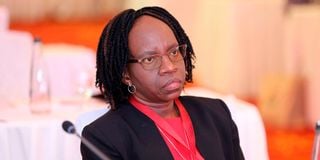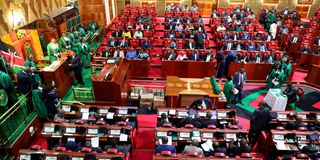Premium
Stolen future: How Sh1.2bn bursary cash meant for poor children went missing

Auditor General Nancy Gathungu. At least Sh1.2 billion for bursaries may have been lost in dozens of counties and constituencies, the Auditor-General has revealed in new reports exposing the misuse of the funds meant for children from poor families.
At least Sh1.2 billion for bursaries may have been lost in dozens of counties and constituencies, the Auditor-General has revealed in new reports exposing the misuse of the funds meant for children from poor families.
Among the red flags in the latest audits are schools reporting they never received the cash purportedly wired to them, amounts reportedly disbursed not reconciling with the number of successful applicants, some students receiving multiple bursaries, undeserving recipients and opaque award processes.
The Sh1.2 billion is enough to sponsor secondary education for 22,794 students in national and extra county schools.
The damning findings come at a time needy students are rushing to file applications for the funds, with schools having reopened for the first term.
Audit reports on bursary kitties in 16 counties in the 2020/21 financial year have queried spending of Sh423 million, with possible cases of theft and illegal use. The kitties are established under governors.
Other audit reports on National Government-Constituency Development Fund (NG-CDF) for some 50 constituencies in 2019/20 also reveal that up to Sh797 million may have been lost or issued to undeserving students. MPs are patrons of these funds. This is even as many bright learners from poor families drop out of school after failing to raise the required fees.
The full extent of the wastage is unclear, given that the audits are selective and are behind by a year, but they offer a glimpse into the rot in the bursary fund that was established to help bright but needy learners.
No confirmation
A Nation review of 66 reports by Auditor-General Nancy Gathungu on counties and constituencies revealed that in most cases where spending of bursary funds could not be verified, beneficiaries did not confirm receiving the money, despite the public entities reporting having disbursed them.
Ms Gathungu also queried cases where some students received multiple bursary awards, awards of bursary to students in private schools, awards of more bursaries than the number of successful candidates and many cases where the entities breached the law in arriving at whom to award.
The four constituencies with the strangest cases were Vihiga, Narok West, Kinangop and Msambweni.
In Msambweni, the Auditor-General revealed that while the constituency issued bursaries totalling Sh29,027,154 during the year, some of the beneficiaries had not applied for the funds. “Examination of the records revealed that 44 beneficiaries were awarded bursary yet they were not on the list of applicants who were issued with bursary application forms,” Ms Gathungu stated.
She reported that in Narok West “there were unexplained differences in bursary awarded to students in the same school and award of bursaries to students in private primary and secondary schools”.
“In the circumstances, it is not possible to confirm that the bursaries of Sh21,940,863 for the year ended 30 June 2020 were awarded to needy beneficiaries as stipulated in the National Government Constituency Development Fund Act,” the report states.

Other audit reports on National Government-Constituency Development Fund (NG-CDF) for some 50 constituencies in 2019/20 also reveal that up to Sh797 million may have been lost or issued to undeserving students. MPs are patrons of these funds.
In Kinangop, cases of double payments totalling Sh259,200 to 30 students were reported, with auditors noting that while the students used different names, the registration numbers were the same.
In Vihiga, while the NG-CDF reported disbursing a total of Sh4.2 million to Vihiga High School and Ikumba Secondary School, the Auditor-General revealed that some money may have been lost along the way.
“... an amount of Sh3,430,000 was disbursed to Vihiga High School and Sh800,000 to Ikumba Secondary School. However, the schools’ managements have acknowledged receipt of Sh3,020,000 and Sh406,000, leading to unexplained variances totalling Sh804,000,” the report states.
Documentary evidence
The majority of the cases where audit reports have raised queries are where the entities report having disbursed monies to learning institutions, but lack documentary evidence or schools cannot confirm receiving the money, eliciting cautionary statements from the Auditor-General that much of the money could be ending up in people’s pockets.
In at least 22 of the 50 constituencies, the Auditor-General queried usage of over Sh20 million in each of them.
Machakos Town Constituency had Sh45.1 million queried, Turbo (Sh41.9 million), Kesses (Sh35.7 million) and Loima Constituency (Sh33.4 million).
The audits on the 16 counties’ bursary funds also revealed misappropriation of the money, including cases where the money disappeared into thin air.
In Siaya, for instance, the Auditor-General revealed that in FY 2019/20, the county education bursary fund indicated closing the year with an account balance of Sh78.8 million, yet in FY 2020/21 it recorded an opening balance of Sh2,000, resulting in an unexplained loss of Sh78,863,000.
“The statement of financial performance reflects Sh88,568,000 in respect of bursaries issued. However, bursaries payments totalling Sh75,530,604 was not supported with acknowledgement letters from beneficiary institutions,” the Auditor-General also said on Nyeri’s Elimu Fund.
Ms Gathungu also queried Sh130 million bursary awards by Narok County, faulting, among others, the use of expensive banker’s cheques and unsupported bursary awards. The county’s bursary fund incurred Sh1.13 million in bank charges for using banker’s cheques instead of normal cheques and used criteria lacking research and data on the eligibility of the beneficiaries, she stated.
“Also, the balance includes an expenditure of Sh240,000 incurred on motor vehicle fuel and repairs. However, the expenditure was not supported since the fund did not own any vehicles,” the Auditor-General said.
Reports on the three counties queried usage of Sh284 million, about two-thirds of the entire amount queried in the 16 counties.
In Embu, of the Sh1.24 million issued, only Sh786,000 was received and acknowledged by schools. The report on Nakuru’s bursary fund shows that the entity could not confirm an expenditure of Sh17.6 million, including Sh16.9 million reported as reversed beneficiary payments (cancelled cheques).
“The fund does not have a risk management policy in place contrary to the provisions of Regulation 158(1) of the Public Finance Management (County Governments) Regulations, 2015,” the Auditor-General stated.
She also added that in Kajiado, the Education Bursary Grants and Scholarship Fund paid Sh748,000 bursaries to students who did not have school registration numbers.
“This is contrary to Section 12 of the Fund Bill, 2015, which requires the committee to verify all the information provided by the applicants through a physical visit to the residence, request for additional information, invitation of applicants to appear in person and any other applicable method of verification,” the report states.
Other counties in which the Auditor-General has raised issues on the management of bursary funds are Machakos, Kilifi, Vihiga, Mombasa, Trans Nzoia, Kisii, Elgeyo-Marakwet, Homa Bay and Taita-Taveta.
In Elgeyo-Marakwet, out of the Sh21 million bursaries disbursed in FY 2020/21, Sh17.2 million supposedly issued to needy students was not supported by acknowledgement receipts.
“Review of documents provided in support of the bursary disbursements revealed that 285 students had applied for bursaries. However, a total of 308 bursaries were awarded, which exceeded the number of applicants by 23,” the Auditor-General observed on Machakos’s Bursary Fund.





